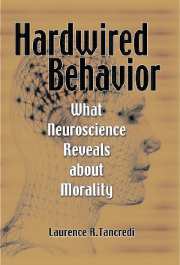Book contents
- Frontmatter
- Contents
- Preface
- Acknowledgments
- 1 Neuroscience and Morality
- 2 Morality and the Mind
- 3 Beyond the Mind Zone
- 4 The Moral Brain
- 5 Bad without Conscience
- 6 The Biology of Choice
- 7 Sex and the Single Moral Code
- 8 Brain Biology and Sex
- 9 Deception
- 10 The Biology of Money
- 11 The Bad and the Mad
- 12 Creating a Moral Brain
- Notes
- Glossary
- Index
3 - Beyond the Mind Zone
Published online by Cambridge University Press: 13 October 2009
- Frontmatter
- Contents
- Preface
- Acknowledgments
- 1 Neuroscience and Morality
- 2 Morality and the Mind
- 3 Beyond the Mind Zone
- 4 The Moral Brain
- 5 Bad without Conscience
- 6 The Biology of Choice
- 7 Sex and the Single Moral Code
- 8 Brain Biology and Sex
- 9 Deception
- 10 The Biology of Money
- 11 The Bad and the Mad
- 12 Creating a Moral Brain
- Notes
- Glossary
- Index
Summary
The shift in our focus from mind to brain did not happen overnight. It represents the outcome of a growing body of research accumulating on the biology of the brain over the past thirty years. Neuroscience discoveries are calling into question the long-held idea first proposed by René Descartes, the French philosopher, that the mind is separate from the brain. The mind was felt to have its own world, a mental life, without influence from the brain. In contrast, the brain has been thought to be the physical organ operating on a mechanistic level to sustain the mind, but not directly affecting the mind.
The old view is that the brain is composed of stand-alone components much as an automobile engine has parts like spark plugs or a carburetor. The new view based on neuroscience research is making it increasingly evident that a close association exists between the brain's physical status and a person's mental processes. Although we have yet to discover biological evidence that when a specific physical action or biochemical reaction occurs in the brain it relates in some consistent way to a specific form or dimension of mental activity, the mind-body association is close enough that many researchers in neuroscience believe that a dichotomy between mind and brain does not exist, but that they are one and the same.
Some early research conducted by Benjamin Libet of the University of California at San Francisco not only supports this position, but suggests that under many conditions changes in the cerebral cortex occur before one is even conscious of a particular feeling, decision, or movement of the body.
- Type
- Chapter
- Information
- Hardwired BehaviorWhat Neuroscience Reveals about Morality, pp. 25 - 33Publisher: Cambridge University PressPrint publication year: 2005



